Gasless ENS Subdomains are used to turn 0x addresses into usernames on Uniswap Wallet
Here you will learn how Uniswap Labs leveraged the Ethereum Name Service (ENS) to introduce Uni.eth Usernames.
Until February 22, 2024, Uniswap Wallet accounts were identified by hexadecimal wallet addresses (like 0xeda6a6fFE2a92A88D7E9FBb60170E784a174cf3F) to send and receive cryptocurrency. Long hexadecimal addresses are more prone to user error, can be spoofed, and keep new users from easily sending and receiving crypto.
The Uniswap Wallet mobile app and browser extension use ENS to provide users with human-readable names, replacing long 0x addresses.
Over approximately 6 months of combined prototyping and implementation, a small in-house engineering team designed an offchain resolver model that allows users to claim up to 5 unique subnames under “uni.eth" for free. By November 2024, more than one million uni.eth usernames had been claimed. And less than a year later, more than two million uni.eth usernames had been claimed.
This initiative improved the user experience by reducing address errors and demonstrated a replicable approach for decentralized identity adoption with ENS.
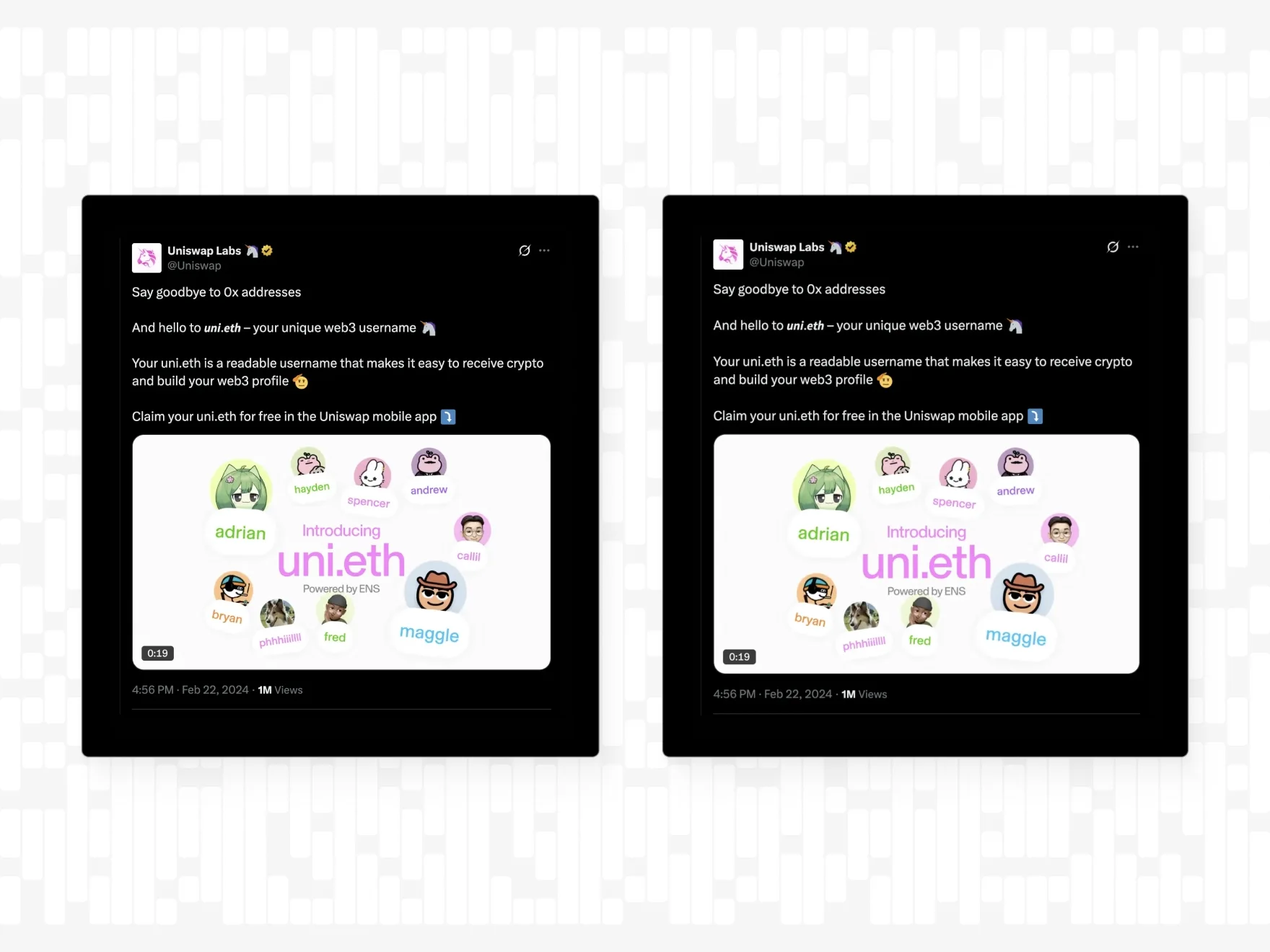
Uniswap is a leading decentralized exchange on Ethereum and recognized that traditional hexadecimal wallet addresses create friction for new and existing users. To address this, the Uniswap Labs team introduced usernames built on ENS’s infrastructure. These usernames are human-readable identifiers that function as subdomains of the parent domain “uni.eth”.
The goal was to simplify the process of sending and receiving cryptocurrency by replacing raw addresses with extensible, user-friendly names.
The integration launched on February 22, 2024, and was initially available through the Uniswap mobile application. Subsequent access via the browser extension followed in July 2024.
ENS provides a decentralized naming system that maps names like james.eth to crypto wallet addresses. Subnames can be created under any ENS name owner’s control. By using its existing name “uni.eth”, Uniswap users can now claim subnames like “james.uni.eth”. This approach requires only offchain operations for creating and managing usernames which prevents users from incurring gas fees.
The uni.eth integration served 4 main purposes:
- Improving UX: Replacing 0x wallet addresses with names
- Brand related names: The association of every username with the Uniswap brand thanks to the user.uni.eth structure
- Global Namespace: Building a global namespace on top of uni.eth that is expandable and can be upgraded with additional features.
- Interoperable Naming: ENS names are multichain and interoperable.
Uniswap Labs’ decision to focus on offchain resolution aligns with their goal of minimizing overall user friction. Uniswap usernames are not transferrable or reclaimable and each user is limited to naming up to 5 wallets with 2 allowed changes to prevent username squatting.
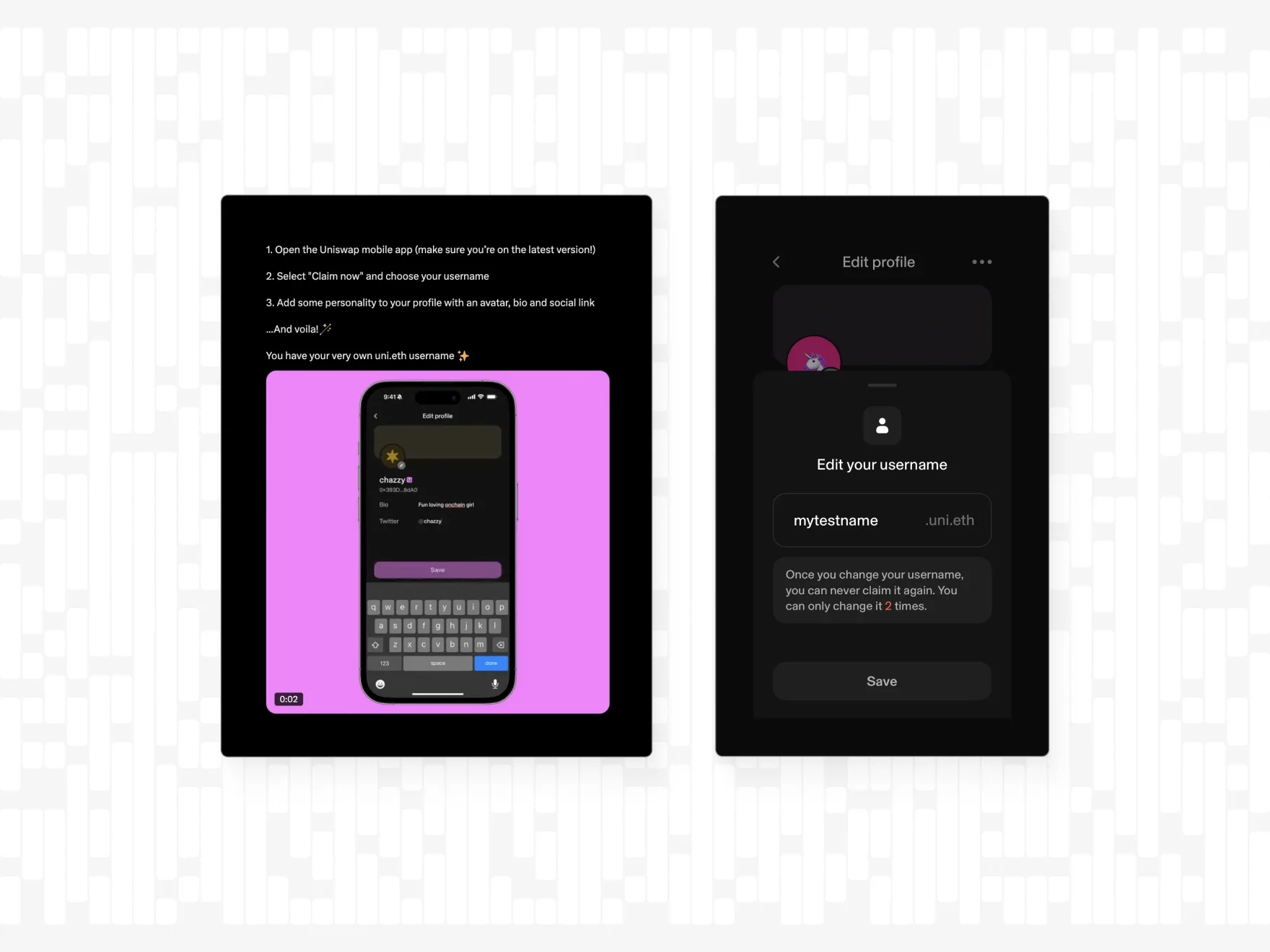
- ENS Parent Domain (uni.eth)
- Managed by Uniswap Labs, this domain serves as the root for all Uniswap subnames.
- Offchain Resolver Contract
- A custom offchain resolver handles subname issuance, name updates, and name-to-address connections without requiring onchain transactions or gas fees.
- Backend
- ENS protocol
- Front End (mobile and browser)
- In-app flow, within the Uniswap mobile app and browser extension to allow users to claim and customize their uni.eth usernames
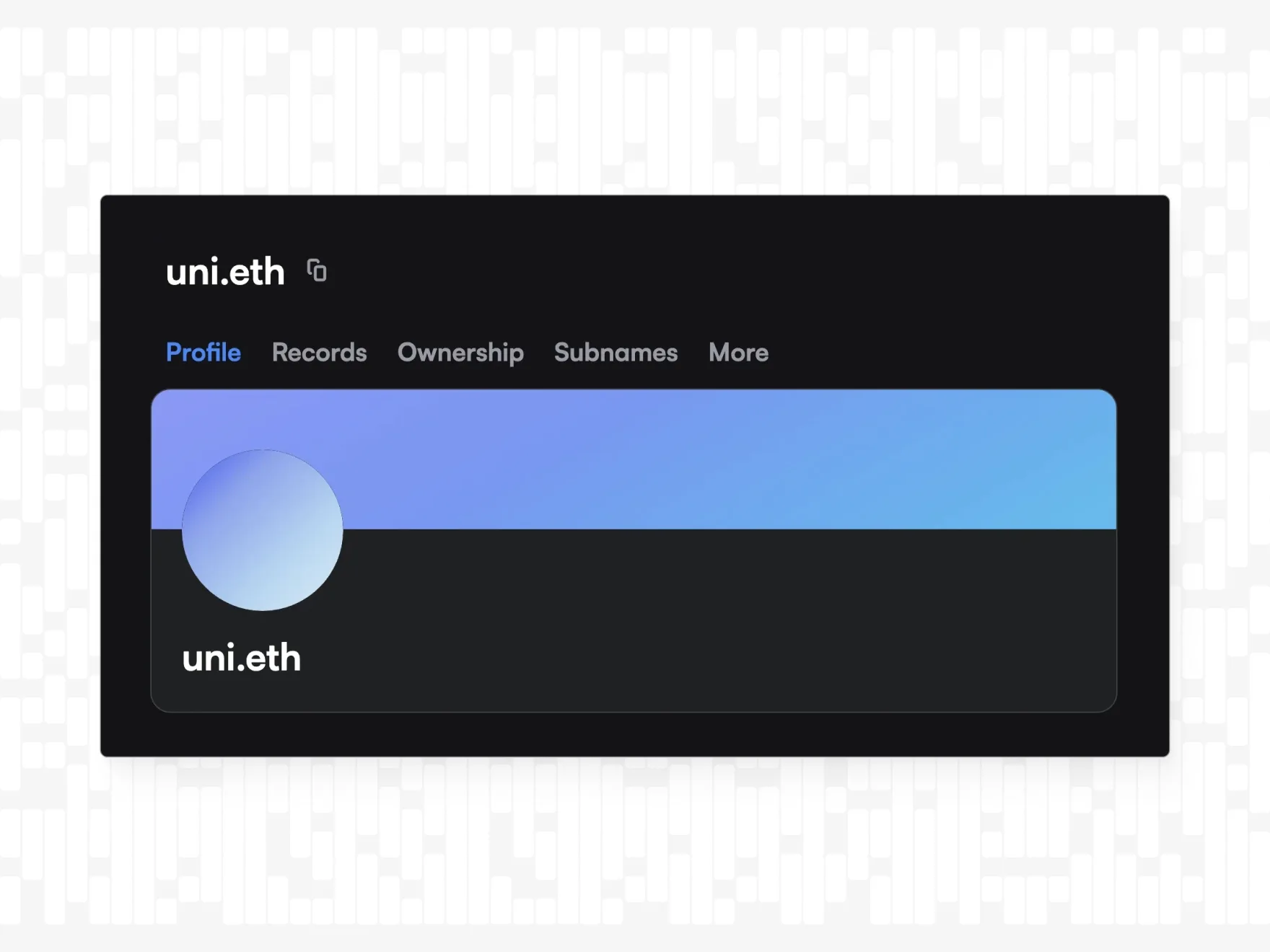
February 2024 - Mobile launch
June 2024 - Over 600,000 Usernames registered
July 6, 2024 - Uniswap Labs granted 100,000 early adopters of Uni.eth usernames access to a waitlisted browser extension

July 9, 2024 - Additional 250,000 whitelisted usernames
November 2024 - 1M registered Uni.eth usernames
September 2025 - 2M registered Uni.eth usernames
These phased releases allowed for performance optimization and generated major community momentum. By September 2025, total username claims surpassed the two million mark, highlighting the viral network effects of ENS’s interoperability.
User onboarding happens entirely within the Uniswap Wallet. Upon downloading the app or browser extension, it prompts the user to select a unique name and optionally customize their Uniswap Wallet profile. This cohesive integration masks the complexity of ENS interactions behind a polished, mobile-native UI, and supports immediate adoption without external tooling.
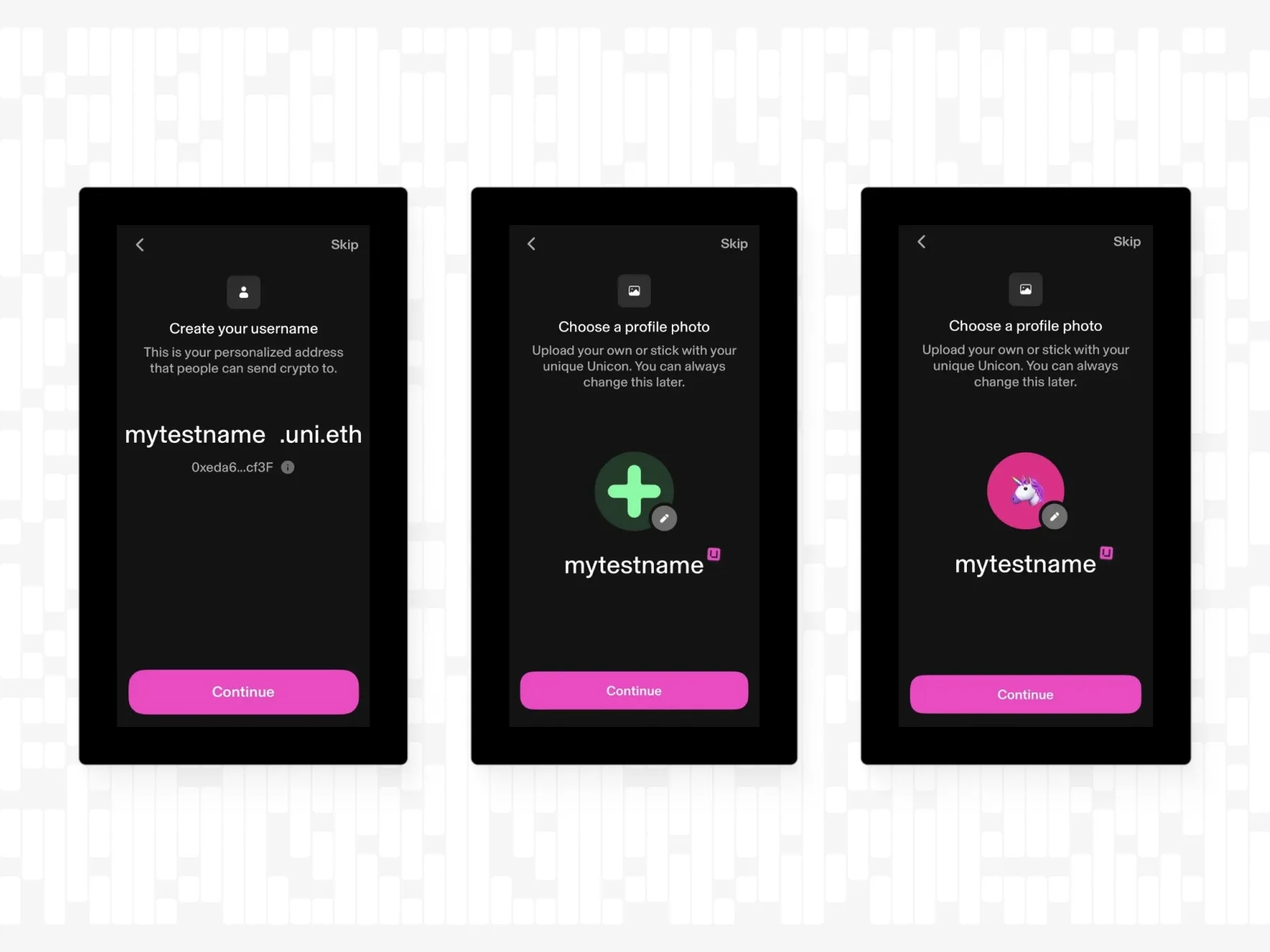
Uniswap Wallet on iOS and Android
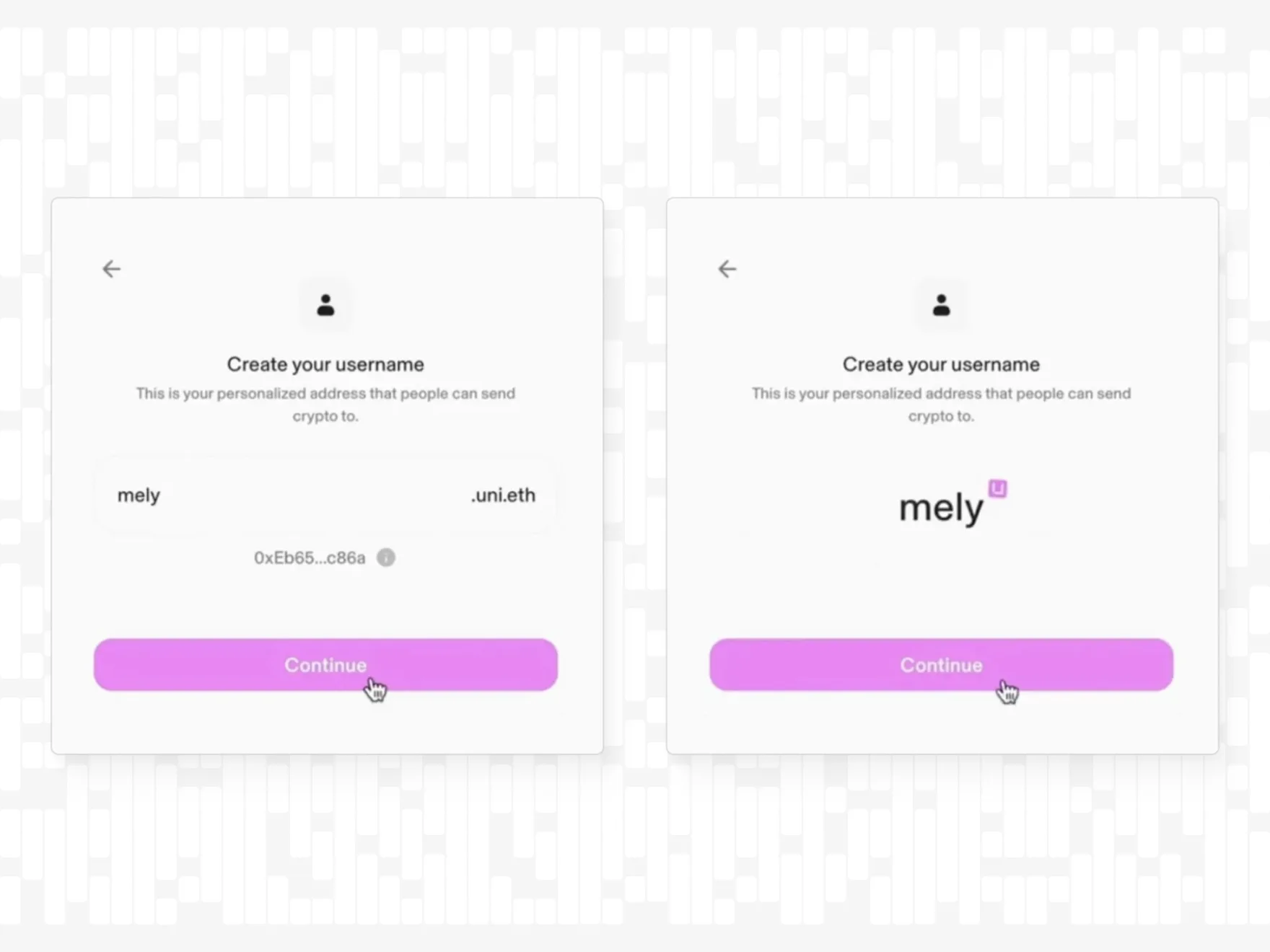
Uniswap Wallet Extension: Account creation flow, Step 1 and Step 2
Uniswap Labs decided to display uni.eth usernames as the bare handle (e.g. "lucas" instead of "lucas.uni.eth") accompanied by a subtle “U” badge. Stripping off the “.uni.eth” suffix creates a cleaner, more familiar interface that mirrors social media conventions and reduces visual clutter on small screens. The magenta “U” badge still signals the uniqueness of the name and brand affiliation to uni.eth without overwhelming the username itself.
Since Uniswap Labs leverages ENS for their usernames, these names can be portable and used within other wallets as well. Within other ecosystems, names will continue to show up with the uni.eth suffix.
At the same time, displaying the bare handle by removing the uni.eth suffix provides a chain agnostic name UI that is aligned with the multichain functionalities of the ENS protocol.
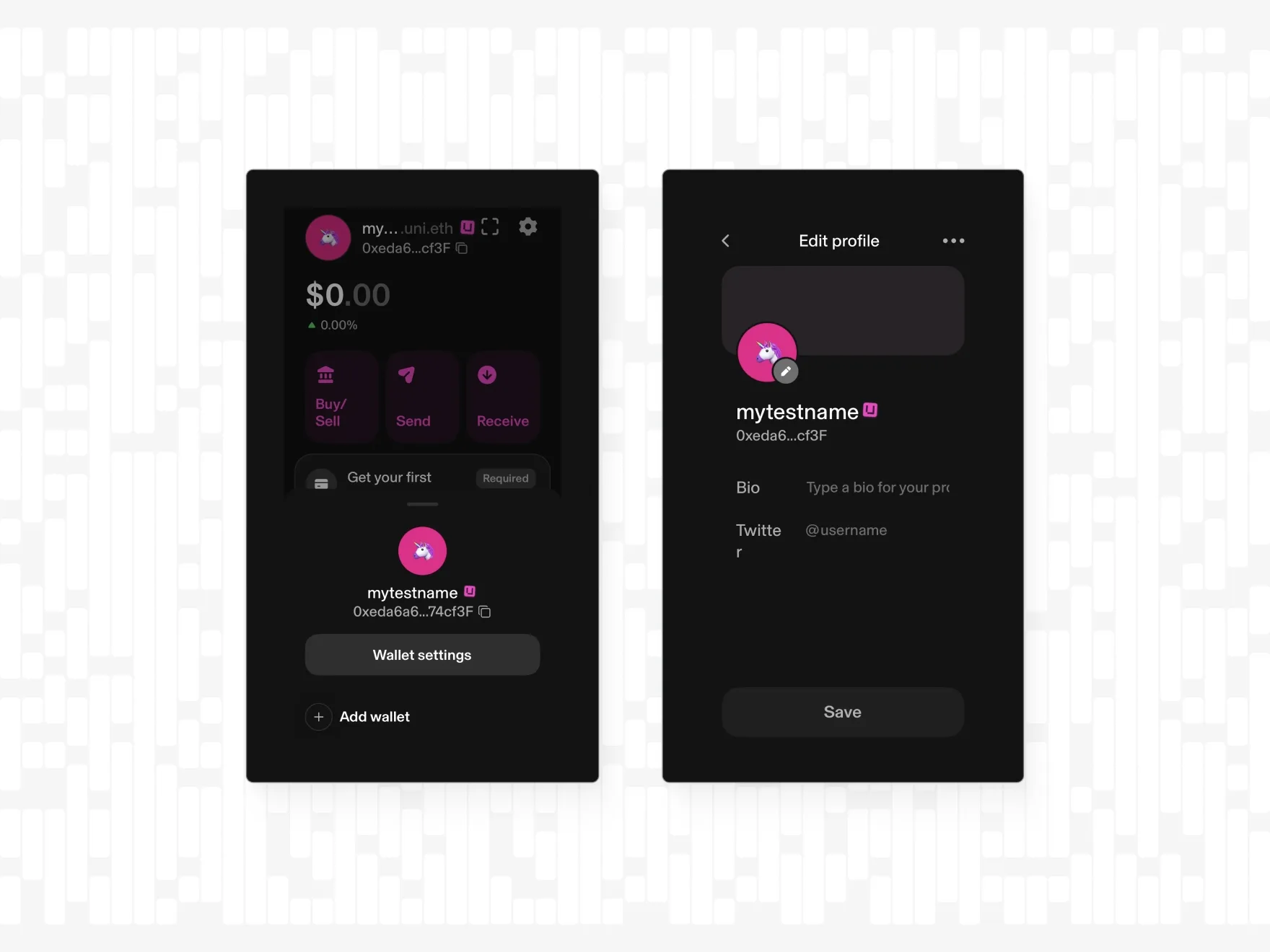
-
Offchain resolvers for a gas-free experience
Offchain resolution removes the barrier of transaction fees and makes decentralized naming appealing to mainstream users.
-
Free Names:
Uniswap Labs made the decision to make their usernames available for free. Claiming or changing a Uni.eth username comes with no registration costs.
-
Limiting name claims per user and per wallet
Enforce a reasonable limit like 5 named wallets per user and 2 name changes per wallet to balance user flexibility with squatting protection.
-
Design for social media-style UI
Display bare handles with a small branded badge rather than the full subdomain of uni.eth. Prevent overloading the name, especially on mobile screens but still add a clear visual cue for the uniqueness of the name to prevent confusion.
-
Provide profile customization
Allow users to create an identity to their ENS subname by adding avatars, bios, and social links (in this case X). This is how you create community engagement.
-
Staggered launch and Marketing effect
Release new functionalities (such as browser extension access) gradually to name owners before giving access to the general public.
-
Maintain docs and support channels
Use existing ENS documentation and direct communication with the team at ENS Labs during integration for the best experience.
Moving forward, there are several ways to expand uni.eth profiles with additional features such as verifiable badges and attestations, L2 onchain migration, and additional crosschain support.
For platforms seeking to simplify their overall onchain experience, Uniswap Labs’ uni.eth case offers a clear blueprint:
- Claim a branded ENS domain, such as uni.eth
- Deploy a lightweight, in-app subname registry
- Deliver seamless UI for name issuance and profile management
By using the ENS protocol as the decentralized naming infrastructure, projects can achieve immediate gains in usability, brand relatability and interoperability and support the mission of a more accessible, user-friendly web. Apps with global communities should offer their users universal usernames and uphold the ENS standard.
Uniswap Labs builds products that help millions of people access DeFi simply and securely ‒ from the Uniswap Web App and Wallet to crypto infrastructure like the Uniswap Trading API, and Unichain. Uniswap Labs also contributes to the development of the Uniswap Protocol, which has processed over $3 trillion in volume across thousands of tokens on Ethereum and 13+ other chains.
The Ethereum Name Service (ENS) is a decentralized, public, and extensible naming system based on the Ethereum blockchain. ENS connects human-readable names like 'nick.eth' to cryptocurrency addresses, content hashes, smart contracts, and metadata. Name registration is done through smart contracts, and although ENS names work across various different chains like Bitcoin and Solana, name ownership is secured by the Ethereum blockchain.